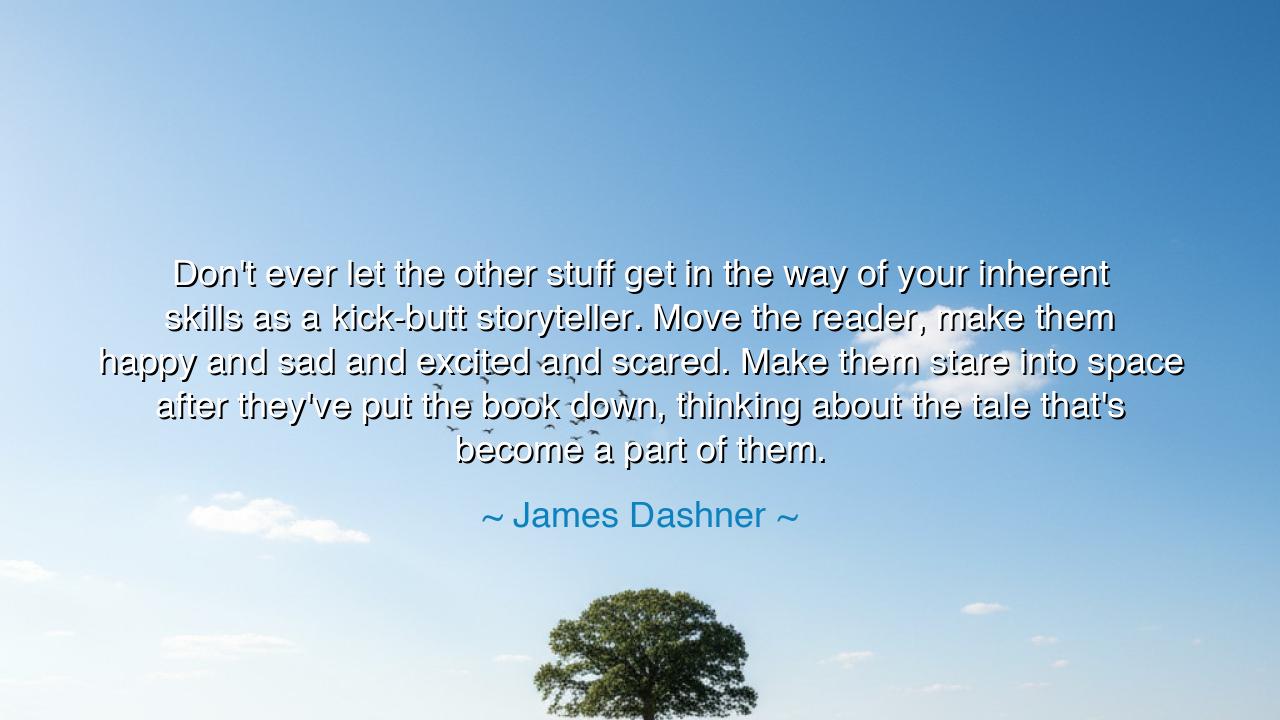
Don't ever let the other stuff get in the way of your inherent
Don't ever let the other stuff get in the way of your inherent skills as a kick-butt storyteller. Move the reader, make them happy and sad and excited and scared. Make them stare into space after they've put the book down, thinking about the tale that's become a part of them.






Hearken, O seekers of wisdom, to the words of James Dashner, who speaks with the voice of the storyteller’s flame: “Don’t ever let the other stuff get in the way of your inherent skills as a kick-butt storyteller. Move the reader, make them happy and sad and excited and scared. Make them stare into space after they’ve put the book down, thinking about the tale that’s become a part of them.” Within this saying is not only a guide for writers, but a command for all who dare to shape human hearts through words. For storytelling is no mere craft of ink and paper; it is the sacred art of stirring the soul, of planting visions in the soil of memory that bloom long after the tale is told.
The heart of Dashner’s call lies in this: do not be distracted by vanity, by applause, by the technical ornaments of craft alone. All these are but shadows if they obscure the fire of storytelling itself. The true storyteller’s duty is not to dazzle with complexity, but to reach into the marrow of human experience—to summon laughter, to awaken tears, to spark terror, and to lift the spirit into wonder. For a story that ends when the last page closes is no story at all; the truest tale lingers, echoing in the reader’s mind, haunting their silences, shaping their dreams.
Think upon the story of Charles Dickens, who walked the streets of London and saw the faces of the poor, the oppressed, the forgotten. When he wrote A Christmas Carol, he did not merely craft words for entertainment—he moved a nation. Readers wept with Scrooge’s repentance, they rejoiced with Tiny Tim’s blessing, and many were stirred to acts of charity and reform. Dickens did not let “the other stuff”—the lure of profit, the pressure of critics—distract him from his inherent gift: the ability to touch the human soul. His tale has lived for centuries because it became not just a story, but a part of those who read it.
Dashner’s wisdom calls us to remember that the true power of a storyteller lies not in technique alone, but in courage—the courage to write with honesty, to bleed truth onto the page, to risk vulnerability so that others may see themselves within the tale. A storyteller must dare to conjure both joy and terror, to guide the reader through valleys of despair and onto the peaks of triumph. This is no easy burden, but it is the sacred task of those who wield the ancient art.
And yet, this lesson extends beyond the pen. For life itself is a kind of storytelling. In every word spoken, every action taken, each soul leaves behind a narrative for others to read. Just as the writer must not be distracted by “the other stuff,” so too must we, in our lives, avoid being entangled by vanity, fear, or the shallow pursuit of approval. Instead, let us strive to live lives that, when others recall them, move their hearts, stir their thoughts, and become part of their own journeys.
The teaching is clear: Do not let the noise of the world silence your inner storyteller. If you write, write with passion. If you speak, speak with truth. If you live, live with meaning. Aim not merely to impress, but to move. Aim not to be admired, but to be remembered in the silence that follows, when others stare into space, feeling that they have touched something eternal through you.
Practical is this counsel: set aside each day a time to tell your truth—whether through words, art, or deeds. Read deeply, not only to learn craft, but to remember how stories have moved you. Practice listening, for the storyteller must first be a gatherer of tales. And when you create, do not measure your worth by numbers or praise, but by whether you have stirred even one heart to think, to feel, to see the world anew. For in that, you fulfill the highest calling of a storyteller.
Thus, James Dashner’s words ring like a timeless command: “Move the reader… make them happy and sad and excited and scared.” This is the fire of the storyteller’s path. To take up this charge is to join the lineage of the ancients, to weave your thread into the great tapestry of human memory. Let us, then, be fearless in our telling, so that our stories, whether written or lived, may echo long after the final page is turned.






AAdministratorAdministrator
Welcome, honored guests. Please leave a comment, we will respond soon